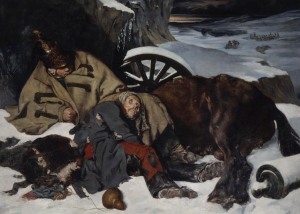December 8 and 9, 1812 were the coldest of the retreat. Accounts of this time detail the misery of those who had struggled on so far as the cold reached new depths. The goal was to reach Vilna with its supposed stocked warehouses and shelter from the cold. But the men were wary, having experienced the disappointment of Smolensk when the stores and shelter there were inadequate.

Retreat Scene from Russian-French War
by Bogdan Willewalde
Lieutenant Albrecht von Muraldt wrote about how his companions were reacting: “Some wept and whimpered. Others, totally stupefied, didn’t utter a sound. Many behaved like lunatics, especially at the sign of a rousing fire or when, after starving for several days, they got something to eat. Only very few indeed were still themselves.”
Surgeon-General Dominique Jean Larrey wrote about the effects of the cold on the starving men: “The muscular action became noticeably weaker. Individuals staggered like drunken men. Their weakness grew progressively until the subject fell – a sure sign that life was totally extinct.” Men who couldn’t keep up had to get to the side of the road, where, lacking the support of their comrades, would fall. “Instantly they were stricken by a painful stupor, from which they went into a state of lethargic stupor, and in a few moments they’d ended their painful existence. Often, before death, there was an involuntary emission of urine.”
Alexander Bellot de Kergorre wrote: “The habit of seeing them grow weaker enabled us to predict the moment when an individual would fall down and die. As soon as a man began to totter you could be sure he was lost. Still he went on a little way, as if drunk, his body still leaning forward. Then he fell on his face. A few drops of blood oozed from his nose. And he expired. In the same instant his limbs became like bars of iron.”

Dead in the Snow
by Ferdinand Boissard
As the temperature only a few miles from Vilna drops to -28° Réaumur (-35° C, -31° F), Major C.F.M. Le Roy says the following prayer: “My God, I who find such happiness in living and admiring your beautiful sun, accord me the mercy of once again being warmed by him and not leaving my wretched remains in this barbarous icy country! Let me see my family again for one hour! Only one hour! I’ll die content. I’ve never asked anything of you, God, as you know! I’ve only thanked you in all circumstances, happy or unhappy, as they’ve befallen me. But this one’s beyond my strength, and if you don’t come to my aid I’m going to succumb under its weight.”
Source:
1812: The Great Retreat, Paul Britten Austin, pp 361 – 364

